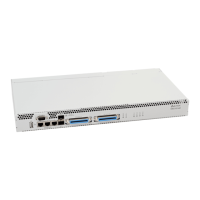SBC session border controllers 101
3. proto — defines the protocol that packets should belong to. This qualifier may take values:
ether, fddi1, tr2, wlan3, ip, ip6, arp, rarp, decnet, tcp and udp.
If the primitive does not contain protocol qualifier, it is assumed that all protocols com-
patible with object type comply with this filter.
In addition to objects and qualifiers, primitives may contain arithmetic expressions and keywords:
– gateway,
– broadcast,
– less,
– greater.
Complex filters may contain numerous primitives interconnected with logical operators and, or, and not. To
reduce the expressions that define the filters, identical qualifier lists may be omitted.
Filter examples:
– dst foo — filters packets which IPv4/v6 recipient address field contains foo host address;
– src net 128.3.0.0/16 — filters all Ipv4/v6 packets sent from the specific network;
– ether broadcast — enables filtering of all Ethernet broadcasting frames. Keyword 'ether' may be omitted.
– ip6 multicast — filters packets with IPv6 group addresses.
For detailed information on packet filtering, see specialized resources.
– Start — begin data collection;
– Stop — finish data collection;
– Restart — restart data collection.
After stopping the packet capture, the right side of the file list will allow you to select to download the
dump from the specified interface to the local computer.
Port mirroring
— traffic mirroring settings:
Port mirroring enables copying of sent and received frames from the gateway switch ports and their
forwarding to another port.
For device ports, available operations are as follows:
– Source ports for ingress packets — copy frames received from this port (source port);
– Source ports for egress packets — copy frames sent by this port (source port);
– Destination port for ingress packets — destination port for copied frames received by selected source ports;
– Destination port for egress packets — destination port for copied frames sent by selected source ports;
Only for SBC-1000

